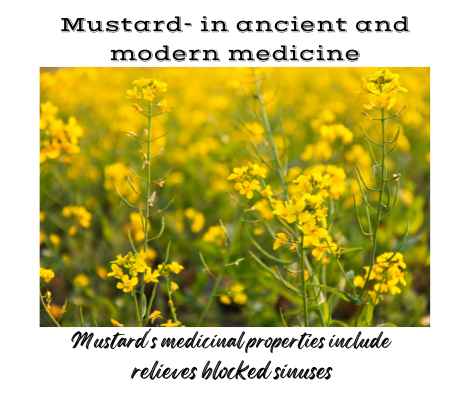Mustard – In ancient and modern medicine
There are three species of mustard consumed by humans. White mustard (Brassica alba) is the mildest of the three. The other two species are Brassica juncea and Brassica nigra. Another species, Brassica campestris, is cultivated for its oil in India.
India produces an average of 6 million metric tons of rapeseed (mainly from B. juncea and B. campestris. Canada produces 200,759 metric tons of mustard seed and has 57 percent (141,660 metric tons) of the global market share, followed by Nepal, Ukraine, and Myanmar. According to 2010 FAO estimates, Nepal produced 149,625, Ukraine 64,400, and Myanmar 58,300 metric tons of seed. However, the high erucic acid content in Indian mustard oil makes it unsuitable for global export. Most importing countries have placed limits on the amount of erucic acid in mustard.
The mustard seed was used in ancient herbal medicine. Hippocrates used mustard in many medicines and poultices. Pythagoras mentions mustard as a remedy for scorpion stings. Mustard was said to increase blood circulation. Mustard plaster helped increase blood flow to inflamed areas, thus hastening healing. By drawing the blood to the skin’s surface, mustard relieves headaches, neuralgia, and spasms. Mustard was thought to be an aphrodisiac in Europe and China. When taken in sufficiently large doses, it warms the body. Mustard was used to relieving toothache, muscle cramps, clogged sinuses, and indigestion. French monks were using mustard to treat wounds. A rubefacient poultice provides relief from rheumatic pain. Hot water poured on bruised seeds makes a refreshing bath good for achy feet, colds, and headaches. Mustard has been used to treat alopecia, epilepsy, snakebite, and toothache. The seed is also used internally as a digestive, diuretic, emetic, and tonic. Mustard oil stimulates hair growth, a popular hair oil in rural India. However, direct application of the oil has been known to cause severe irritation.
Brassica alba is not used as medicine in developed regions of the modern world. In China, it is used to treat phlegmy cough, tuberculosis, and pleurisy. Limited human evidence supports the use of mustard plaster for bronchitis or mustard oil for preventing heart attack. Moreover, evidence is conflicting on whether mustard oil effectively lowers cholesterol. B. alba is traditionally used as a massage oil in southern Asia. Its beneficial effect has not been scientifically examined.
B juncea seed is a warming, stimulant herb with antibiotic effects. The medicinal properties of the species are similar to B. nigra. The seed is used in the treatment of tumors in China. The Chinese eat the leaves in soups to treat bladder ailments, inflammation, and bleeding. The root is used as a galactagogue in Africa. The odor repels mosquitoes. In Java, the plant is used as an antisyphilitic emmenagogue. Leaves applied to the forehead are said to relieve headaches. B. juncea has hepatoprotective properties that may be useful for treating liver disease (Gupta et al., 2011). The aqueous seed extract of B. juncea has shown potent hypoglycemic activity in male albino rats, indicating antidiabetic use of the source (Tirumalai et al., 2011).
Jasim (2012) found that the antibacterial action of B. nigra seed oil against Staphylococci and Escherichia species in the dental plaque of children 1–5 years old was comparable to that of gentamycin and ciprofloxacin. Stoin et al. (2007) showed the antibacterial property of B. nigra against multiple pathogenic bacteria. Kiasalari et al.’s (2012) experiments on mice show that the B. nigra seed extract can be used in grand mal seizure treatment because of its antioxidant property that acts via an enzyme activity mechanism. The spice of the oil of B. nigra is from erucic acid and isothiocyanates, which are said to cause accumulation of triglycerides in the blood and thus considered bad for the heart; however, human trials have not been conducted to confirm these negative health effects. Nevertheless, in the United States and parts of Europe, mustard oil is permitted for external use and cannot be sold as cooking oil. Canola oil from B. juncea seeds that are crossbred is allowed for use in food because this oil has very low levels of erucic acid.
Holy Herbs; Modern Connections to Ancient Plants
